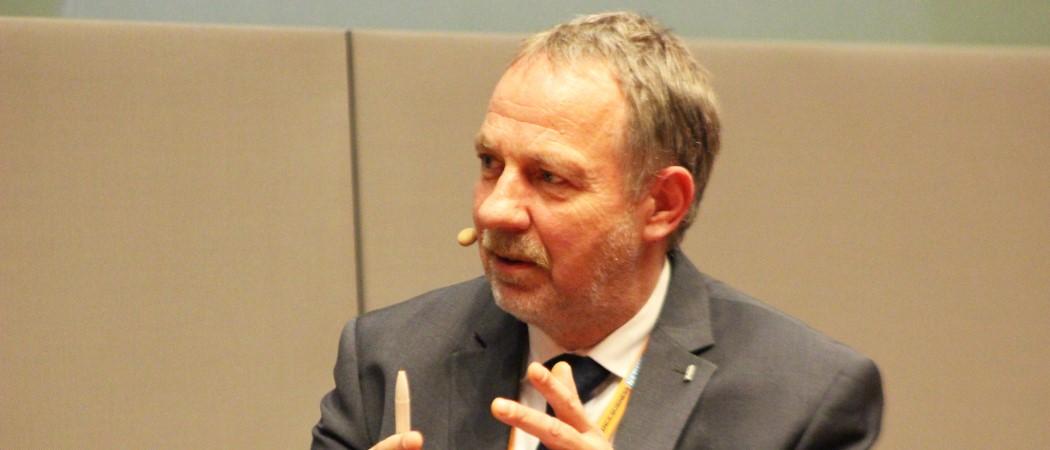For Europe to maintain its position as a science leader, a continued focus on the basics of curiosity-driven research must be blended with forward-thinking adjustments in the protection of intellectual property

Detlef Günther, vice president for research at ETH Zurich. Photo: Science|Business Flirckr
Europe’s continued leadership in science depends on supporting some central elements of innovation - basic research, internationalisation of research and refining the tricky balance between keeping research open while using intellectual property policy to support the application of research.
European universities have always been leading advocates of the value of curiosity-driven, basic research as the main source for innovation, and have been one of the primary homes for such research.
The fast response to the COVID-19 pandemic was made possible by decades of basic research by international teams on coronaviruses, RNA-based vaccines and diagnostic biomarkers. As the pandemic has so graphically illustrated, it is crucial to have a framework that allows curiosity-driven research to thrive across national borders.
Studies dating as far back as the 1950 have shown how basic research generates the new knowledge and understanding needed to drive innovation. There is a broad consensus that basic research has the characteristics of a public good with spill over effects. Given this, it requires public engagement and support.
For the most part, basic research is funded and provided by national governments, which see it as a means to stimulate private innovation in their domestic economies. More specifically, there is empirical evidence for the following:
- Academic research has a significant, positive impact on innovation and success across many industries;
- Basic research is the component of total R&D that has most effect on productivity growth;
- Small firms benefit relatively more from university research than larger counterparts.
Hans Gerbach, professor of macroeconomics-innovation and policy at ETH Zurich and a former chair of the scientific advisory board of the German Federal Ministry for Economic Affairs and Energy, has shown basic research is a key driving force of economic growth and technological progress.
Companies close to the technological frontier can discourage entry of foreign competitors through innovation based on public research conducted by universities—the first link in the value creation chain.
In light of this, ETH Zurich supports the target of investing (at least) 3% of European GDP in research and development and also the new target of raising the level of public investment in research from the current 0.81% of GDP, to 1.25% by 2030, as stated in the 2020 communication, A New ERA for Research and Innovation.
Paradox of openness
Openness in principle and in practice is a prerequisite for excellent research. But while sharing knowledge is vital for value creation, protecting knowledge is critical for value appropriation. The “paradox of openness” describes this fundamental tension between knowledge sharing and knowledge protection. Intellectual property policy is one of the key components of innovation policy, through which governments can give economic actors financial incentives to commercialise innovations.
An ETH Zurich scholar, Stefan Bechtold and his research group, has shown that patents facilitate transfer of technologies across innovating firms. In addition, in core fields such as pharmaceutical development, a strong case can be made that patents encourage innovation and ultimately promote social welfare.
However, the beneficial effects of the patent system in one industry do not necessarily work in others. Open source software is a prime example of a highly innovative industry in which copyrighted works are broadly shared with few restrictions.
This diversity, as well as the way in which the use of patents evolves with technologies, calls for continuous adaptation and fine-tuning of the patent system, both on a European and a global level.
Science|Business has taken up this call with its declaration, “Open and closed: A call to rethink the way we handle global research and innovation.”
The challenge is to responsibly manage innovation in programmes such as Horizon Europe, while being fully aware of the “paradox of openness” and that the creation of innovations requires openness, while commercialisation of innovations might require protection.
As mentioned above, the beneficial effects of the patent system in one industry do not necessarily translate to other industries. Its impact is likely to vary across industry sectors, companies of different sizes and other characteristics. As Bechtold and other scholars indicate, further evidence-based studies and debates on the role of patents in fostering innovation are needed.
In the light of ongoing discussions on fostering European open strategic autonomy, we want to emphasise the value of responsible and sustainable international cooperation. International research cooperation and technology partnerships are an important instrument for mobilising complementary competencies and achieving technology interdependence with other selected countries, based on (financial) reciprocity and shared universal values and principles.
As part of this international cooperation and openness, we believe Swiss universities have a lot to offer other European universities, regardless of the state of discussions with the EU about access to the single market.
ETH Zurich advocates, together with its European partner universities in the CESAER association, for a European research and innovation policy built on trusted global science networks and based on the principles of freedom of scientific research (Bonn Declaration). ETH Zurich is eager to join other European universities to contribute to strengthening European innovation and to build on a strong base of curiosity-driven research and a finely-tuned relationship between patent protection and innovation.





 A unique international forum for public research organisations and companies to connect their external engagement with strategic interests around their R&D system.
A unique international forum for public research organisations and companies to connect their external engagement with strategic interests around their R&D system.